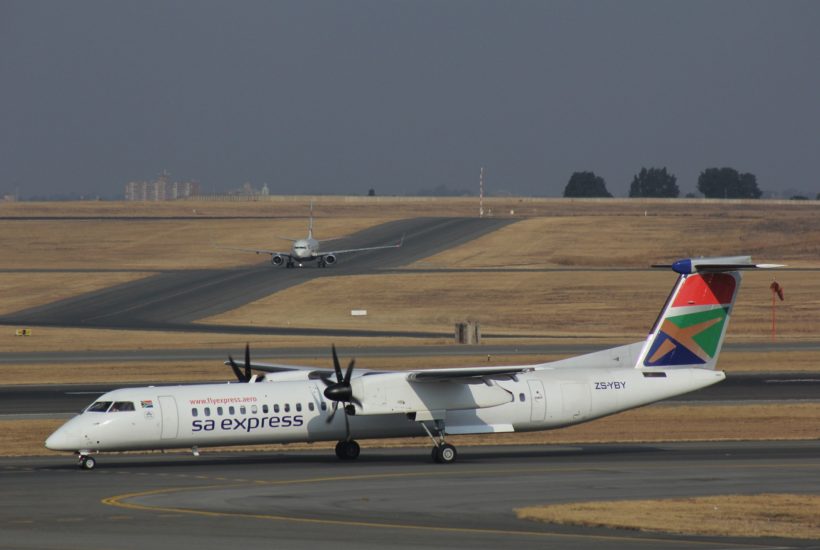Africa
A South-African airline ceases operations due to the COVID-19 pandemic
The COVID-19 pandemic has recently spread to several African countries. The consequences on the continent’s economy have already started to be felt, starting with the tourist industry. Several airline companies are facing problems due to the closure of the borders in an effort to stop the pandemic. As a consequence, South Africa Express will completely cease its operations.

The regional airline South Africa Express (SAX) has just announced that it will cease operations completely as of 18 March 2020, “in the light of recent adverse developments, including the Covid-19 outbreak,” company’s officials said in a statement. All non-essential personnel is being placed on layoff and customers will be redirected to other companies.
The decision seemed inevitable because of the financial losses accumulated over the past decade or so. They are estimated at more than $65 million (1.2 billion rand), despite the state aid received in September 2019 amounting to $16 million (300 million rand). The aid was intended to ensure the company’s financial liquidity in order to help it continue its operations.
Born2Invest application is a fast and easy way to check the latest business headlines. It gives users access to recent publications and stories, media and objective analysis, thematic sections and feeds. It’s impossible to keep up with everything you’re interested in, but our companion app will help you keep track of the important news from all over the world, including the most important financial news from the African continent.
The closure of the borders was the last straw for South Africa Express
In February 2019, the company South Africa Express became the second state-owned airline to go into business rescue after South African Airways.
SAX will now look into reorganizing its network, but it also announced that it will have to rationalize its activities, without further details.
The announcement of the closure of the borders on March 15th, 2020 by President Cyril Ramaphosa sounds like a coup de grâce for national air aviation. International services are interrupted, and the regional flights will also suffer the absence of customers, including foreign tourists, who are deprived of visas.
South African Express flights included, among others, East London, Cape Town, Kimberley, Port Elizabeth, Mthatha, and Gaborone.
Restructuring or disappearance for the African Airways
Prior to the SAX announcement, South African Airways, the country’s leading airline, had just announced a severe restructuring plan. The message was clear: restructuring or disappearance.
As a result, nearly half of the employees – 2,268 out of 4,708 – are expected to lose their jobs. A rescue plan was drawn up. “The current structure negatively affects the efficient operation of the company and, in turn, its profitability and sustainability,” the company explained. A plan to reduce the fleet from 49 to 18 aircraft is being considered and, as a result, fewer destinations will be served.
Over the past six years, the state-owned airline has recorded cumulative losses of $1.4 billion (26.1 billion rand). The biggest losses registered by the company were in the 2016/2017 financial period, but huge losses were also registered during the 2017/2018 financial year as well as during the 2018/2019 period.
The South African government has been trying to save the airline company but has never been able to turn the situation around. Besides that, now South African Airways will also have to deal with the consequences of the coronavirus pandemic. The company announced that it will cancel 162 flights until the end of March, of which 38 are international flights and 124 are regional ones.
__
(Featured image by Nel_Botha-NZ via Pixabay)
DISCLAIMER: This article was written by a third party contributor and does not reflect the opinion of Born2Invest, its management, staff or its associates. Please review our disclaimer for more information.
This article may include forward-looking statements. These forward-looking statements generally are identified by the words “believe,” “project,” “estimate,” “become,” “plan,” “will,” and similar expressions. These forward-looking statements involve known and unknown risks as well as uncertainties, including those discussed in the following cautionary statements and elsewhere in this article and on this site. Although the Company may believe that its expectations are based on reasonable assumptions, the actual results that the Company may achieve may differ materially from any forward-looking statements, which reflect the opinions of the management of the Company only as of the date hereof. Additionally, please make sure to read these important disclosures.
First published in, a third-party contributor translated and adapted the article from the original. In case of discrepancy, the original will prevail.
Although we made reasonable efforts to provide accurate translations, some parts may be incorrect. Born2Invest assumes no responsibility for errors, omissions or ambiguities in the translations provided on this website. Any person or entity relying on translated content does so at their own risk. Born2Invest is not responsible for losses caused by such reliance on the accuracy or reliability of translated information. If you wish to report an error or inaccuracy in the translation, we encourage you to contact us.

-

 Crowdfunding2 weeks ago
Crowdfunding2 weeks agoNewcleo Raises $85 Million to Advance Fourth-Generation Nuclear Reactors
-

 Markets8 hours ago
Markets8 hours agoMarkets, Jobs, and Precious Metals Show Volatility Amid Uncertainty
-

 Biotech1 week ago
Biotech1 week agoDNA Origami Breakthrough in HIV Vaccine Research
-

 Markets2 weeks ago
Markets2 weeks agoGold’s Historic Surge and Sudden Crash Signal Volatility, Not Defeat
























